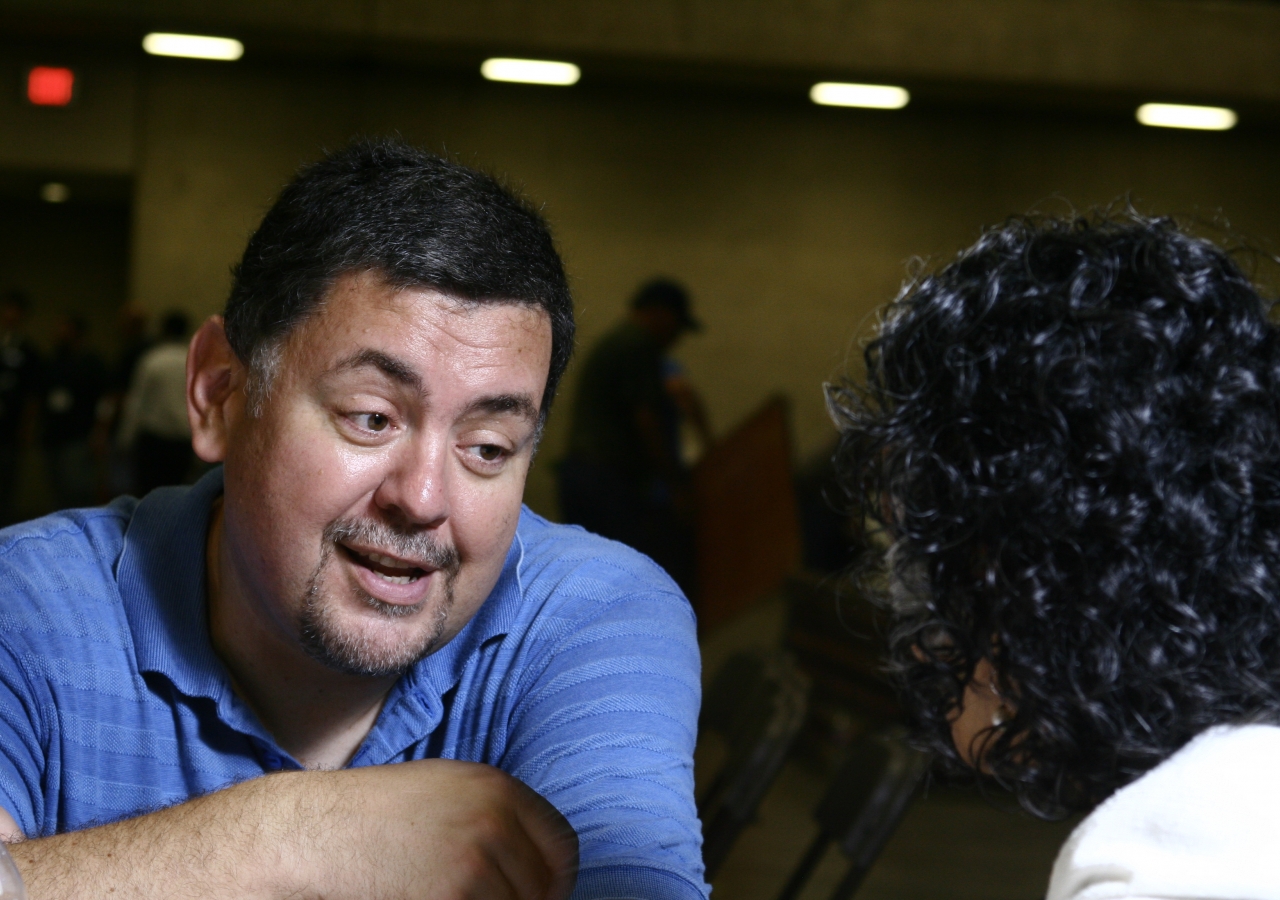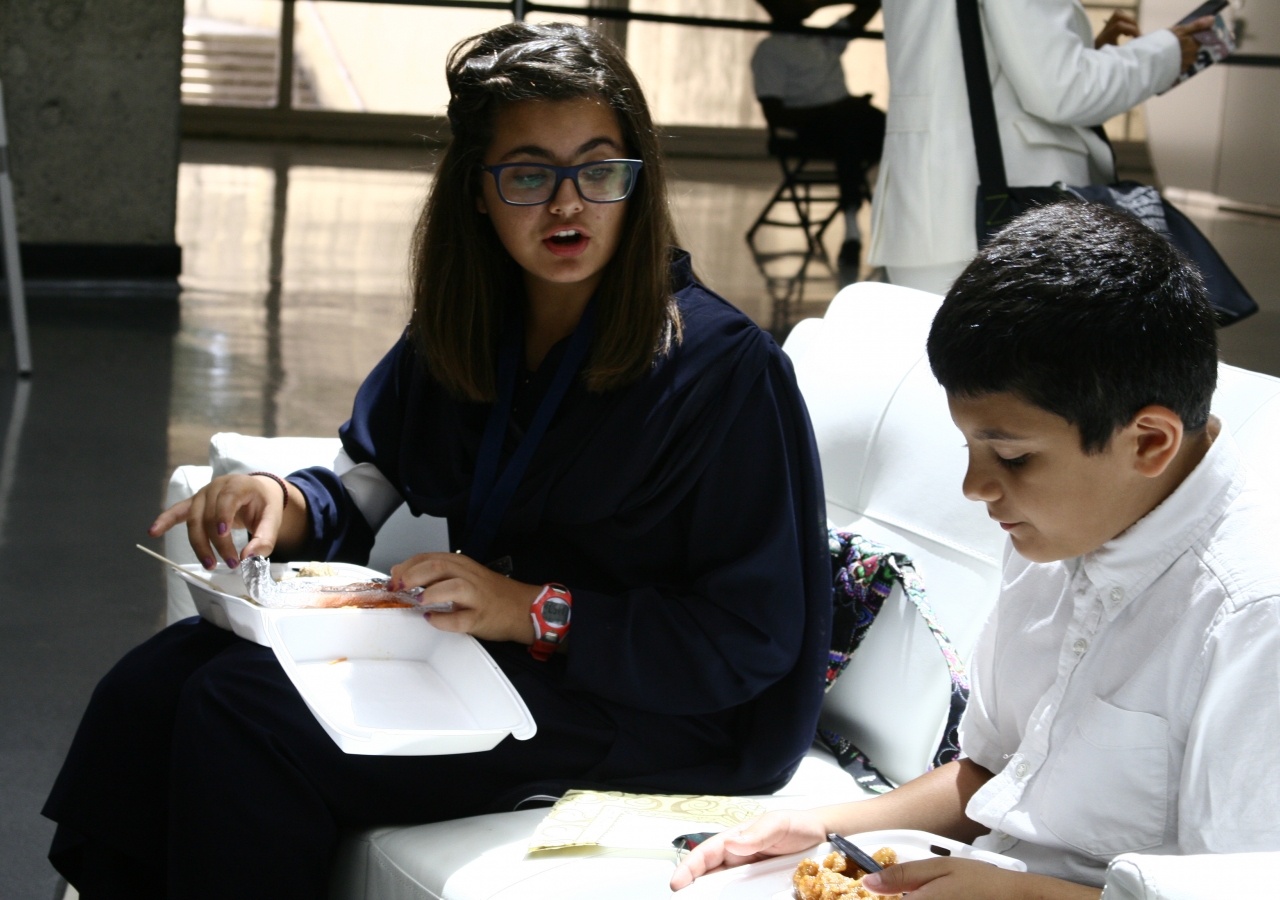With other Ismaili interfaith families, my husband Mahebub Dossa and I, joined the Central United States Jamat at the Kay Bailey Hutchison Convention Center in Dallas, to celebrate the Imam’s Diamond Jubilee. My husband, who is a member of the crisis management team, headed to his post and I enthusiastically made my way to the Communication Hub to find my partner, Faisal Ladak, photographer for the reporting segment on the interfaith experience. We arrived at the interfaith lounge to find a family of three generations.
Noorbegum Keshavjee, almost 80 years of age, was sitting in the lounge with a smattering of Jamati members. They were all sitting and socializing on comfy white sofas and chairs in a beautifully carpeted area with natural light flowing in from the high ceilings. Noori, as she is affectionately known, was with her daughter Sakina Vidacak, 47, and her two grandchildren, Yasmina Vidacak, 12, and Luka Vidacak, 10. Her son-in-law, Dubravko Vidacak, was on duty, helping to set up the dining hall for what was expected to be a crowd of more than 10,000 Jamati members.
I asked Noori about the Diamond Jubilee and other jubilees that she has experienced in her lifetime. Noori shared:
“I was eight years old when we went to observe Imam Sultan Mahomed Shah’s Diamond Jubilee in Dar es Salaam. We traveled for a week in two trucks, the entire family. We stopped at different Jamatkhanas along the way and spent the night in the Jamatkhana guest house. The Jamat knew there were travelers in the guest house and they would bring us breakfast in the morning before we started our journey to Dar es Salaam. It was an arduous journey but I remember the fun part: the family all traveling together. Compared to that Diamond Jubilee, this is more global.”
When I asked Noori about the work of Mawlana Hazar Imam, she said, “He has played an amazing role in bringing forth the new generation of Ismailis by encouraging them. Hazar Imam has impressed on us that Islam is not just acknowledgement of Allah but Islam is also how you treat other people and your humanitarian nature.”
Her daughter, Sakina Vidacak, is an Ismaili Muslim, as are her children. She stated that her husband, Dubravko, an interfaith family spouse, is supportive of her and her children’s involvement in Jamatkhana and Jamati service. He plays an active role in everyday activities, from dropping and picking up the family for prayer services and religious education classes, to helping their children learn their prayers, and most recently by helping set up the physical site where the Diamond Jubilee celebration took place.
“Everybody knows my husband by his face, his nickname ‘D,’ and his height as he towers over members of the Jamat.” Sakina said. “Dubravko starts every conversation with, ‘Ya Ali Madad uncle or auntie.’” Sakina adds, “While we have our challenges, we’re lucky because of his willingness to be involved in the Ismaili community, the community’s welcome of him, and the encouragement of family and friends.”
Sakina has served in many capacities as a volunteer, following a family tradition of service to the Imam and the Jamat. She notes that whatever the service, large or small, it is for the Imam and the community. She indicated that the rapid growth of the Jamat all over the world is a challenge, but she is grateful for the generational stories shared by her mother and father, whose families had the privilege of encounters with Imam Sultan Mahomed Shah, Prince Aly Khan, and the present Imam.
Sakina noted that cultural melding of religions and traditions makes people stronger and it has made their family stronger. This was evident in my conversation with her children, Yasmina and Luka. “Our mom is from Africa and our dad is from Serbia in Europe,” Yasmina said. When asked about Diamond Jubilee, she proudly noted, “We worked all weekend to get ready for this day.”
Luka eagerly helped putting together the tiles and packing snacks for the Imamat Day celebration. Yasmina appreciates how the community has embraced her interfaith family and especially her father. Yasmina and Luka also know other interfaith families in their Jamat with children with whom they are friends. “I know my nani had so many siblings and some of her nieces married non-Ismailis,” Yasmina said. I love that our family is not the only interfaith family and the Imam is also welcoming others.”
Faisal and I then made our way to the dining hall and found Dubravko engaged in the heavy lifting required to set up the hall. As he refreshed himself with a cold bottle of water, he shared that he was introduced to Sakina by his sister. They remained friends for several year before marrying. “Even though we have different backgrounds that is only a small portion of our lives since there is so much more that we have in common than the difference in religion,” he said. He shared that his dad is Catholic and his mother belongs to the Christian Orthodox tradition.
We asked Dubravko about his presence today and his willingness to spend the day volunteering. “I’m here for the love of my wife and my children and our family,” he said. About the strengths and challenges of being accepted by the Ismaili community, Dubravko shared: “The love of my wife and friends who accepted me made it easy. I really didn’t have any challenges.”
Dubravko and I both reunited in the afternoon with our Ismaili spouses, Sakina and Mahebub, in the interfaith lounge, where they both chose to volunteer in this area while the Jamat was engaged in the Homage Ceremony. While there, we were delighted to meet one family who traveled from the east coast to take part in the day.
Urvi Dalal, who is Hindu, and her husband Nadeem Walji, who is Ismaili, were visiting from Manhattan, New York. Urvi is no stranger to the Ismaili community - the couple often hosts events for the Manhattan Ismailis and their children. Urvi and Nadeem said they decided to spend their Imamat Day in Dallas to celebrate with family and friends. One of their friends, Kamini Mamdani is also Hindu and married to an Ismaili, Malik. Both Urvi and Kamini shared that their children are Ismaili, and that complete inclusion into the community is a challenge at times. They both expressed a desire to be more involved within the Ismaili community and they hoped that the Jubilee year will provide more opportunities to do just that.
Urvi shared, “It’s so nice to celebrate as a family and for the kids to be with their grandparents. Their grandparents remember when he (Mawlana Hazar Imam) became Imam and now when they look back at today they’ll remember sharing the day with their grandchildren.”
For Nadeem, the Imamat Day celebration was a good way to show their children what it’s like to be a member of a global Jamat. “The celebration is different in Manhattan where there may be only a few hundred people,” he said. “To be here with thousands, is really great for the kids.”
I felt a sense of camaraderie as I connected with interfaith families that day. Many were excited to be celebrating with family and friends. It was evident that the common thread which bonded interfaith families was their love for family and humanity.
About the author: Dr. Miriam Ezzani is a professor at the University of North Texas, where she teaches graduate courses in educational leadership. As a volunteer for the Aga Khan Foundation USA since 2010, she has shared her expertise in leadership and social justice with the AKF Youth Ambassadors.









